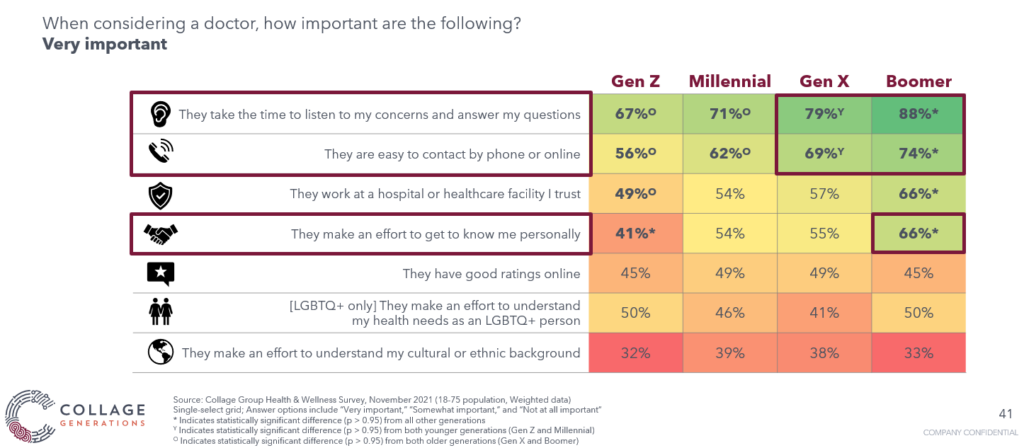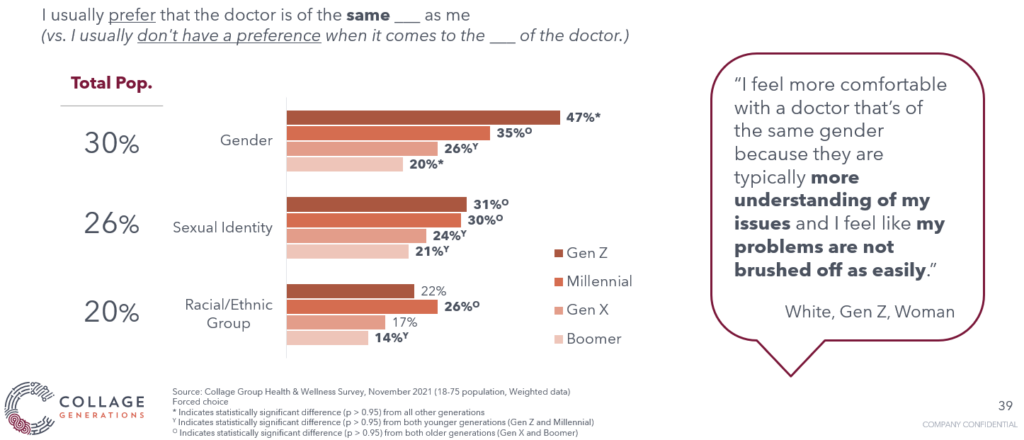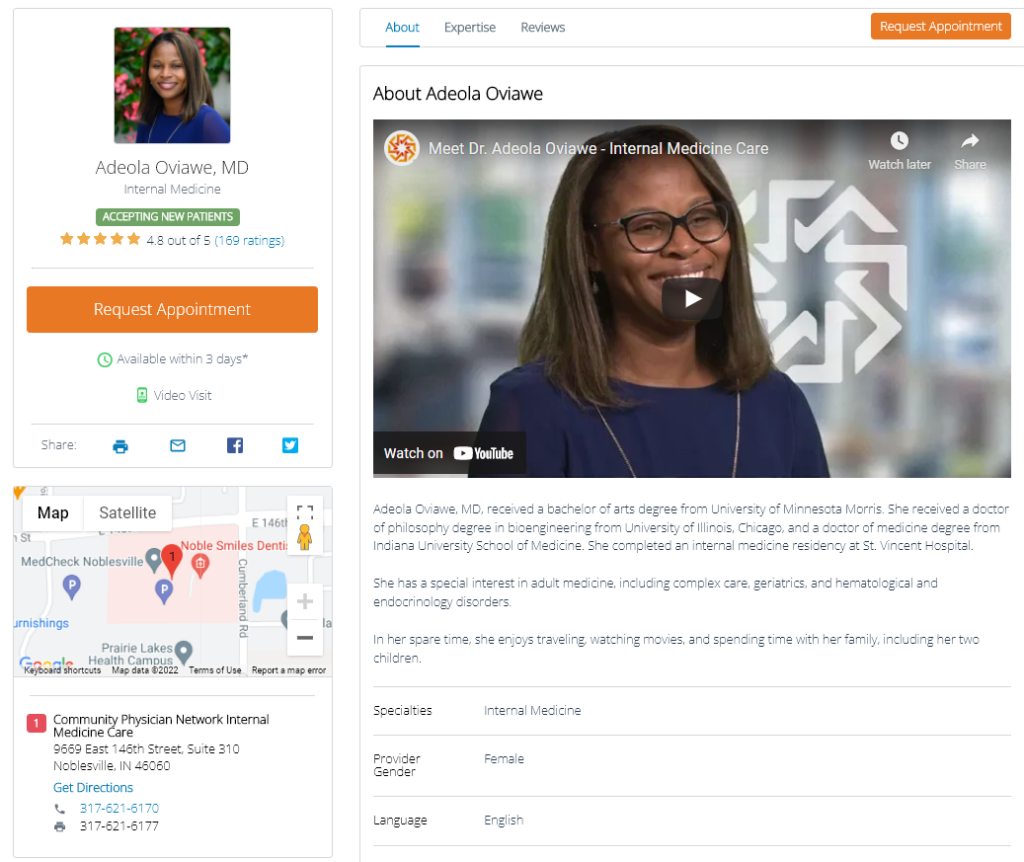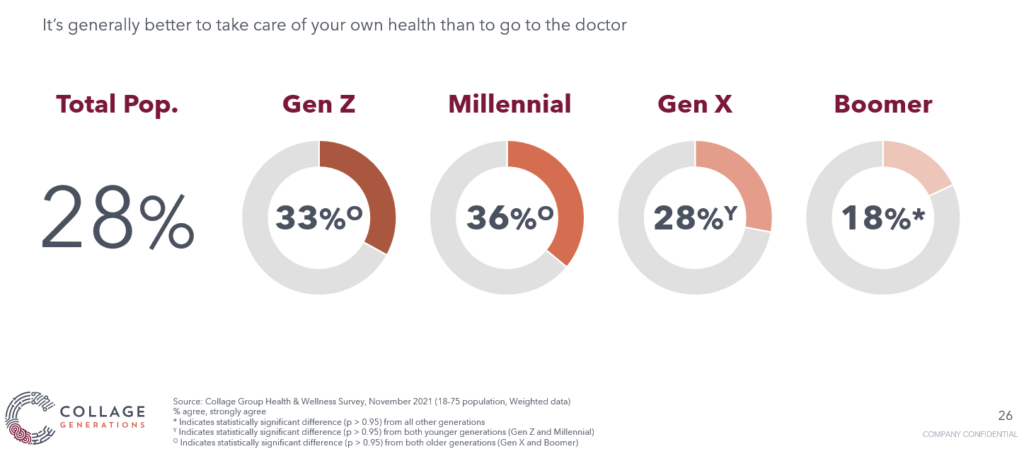Health Care Across Generations

Each generation approaches the patient journey from a unique perspective. Keep reading for key insights and au0026nbsp; downloadable deck on generational differences in health-related attitudes and behaviors and the emerging consumer mindset.
Health and wellness are top of mind for consumers. With healthcare costs higher than ever, Americans are acting more and more as “consumers” when it comes to their healthcare and health insurance. They want to get bang for their buck by being more choosy and “shopping around.” As a result, they’re more sensitive to price and think even more critically about their symptoms before deciding it’s necessary to seek care. And when they do, many are turning to cost-effective options like virtual care.
The rise of consumerism in healthcare means you’ve got to be thinking about all the levers that traditional service-oriented businesses have leaned on to win consumers. Highlighting and providing excellent service and competitive cost are two that many in healthcare still struggle with. To win consumers and provide them optimal care, you must understand how these factors are constantly shifting consumers’ expectations, needs, and desires.
Collage Group’s 2021/2022 Health & Wellness Study covers generational differences in healthcare-related attitudes and behaviors. Our research reveals how the emerging consumer mindset affects each generation’s attitudes and behaviors in healthcare.
Download the attached presentation and take a look at a few key insights and implications below:
#1: Gen X and Boomers emphasize doctors’ qualitative attributes, so provide bios that allow each individual doctor’s strengths to shine and focus your marketing efforts on how your organization stands out with excellent service. Your organization has exceptional talent, so make sure you get the credit for it!

#2: Gen Z and Millennials emphasize their doctor’s identity attributes, so add filters (gender, race, etc.) to provider search tools to allow them to refine their search for a doctor they value. It’s important to make it easy for them to find a doctor they feel comfortable with. Finding a doctor with shared identity can also help them to feel less anxious.

Indianapolis-based Community Health Network differentiates their medical facilities by highlighting the exceptional care they offer. Their creative showcases their patient-centric values and community-driven approach (the audio track in the ad was even performed by Community Health Network employees!). The ad affirms the network’s focus on service by communicating the diversity in their providers, showing that every patient can find a doctor who will listen to and understand their unique needs.
To bolster the themes in their creative campaign, Community Health Network has a robust provider search tool on their website. Each doctor has a short bio and an introduction video so that patients can evaluate them on a more personal level beyond their credentials. They can hear their voice and see their smile—as well as learn about their passions in healthcare and their approach as a physician. The website’s search tool allows patients to filter by different attributes like gender and language. The site even has a section for reviews.

#3: Younger Americans have a more self-sufficient health perspective. They also say that feeling worried or anxious is the top reason they avoid care. Help them feel more empowered in their health by giving them some control over their health journey. This will help grow their trust and inspire confidence in themselves.

Executional Example
Virtual care company LetsGetChecked was founded in 2015 with the goal of empowering people to manage their own health from home. They provide at-home sample collection kits which can be sent to healthcare facilities for results. They also provide telehealth services. This innovative healthcare approach caters to the unique needs of younger Americans who want control and self-sufficiency in their health journey, and simultaneously are anxious and turned-off by conventional healthcare services.
Contact us at the form below to learn more about how you can gain access to these diverse consumer insights and much more in our cultural intelligence engine.